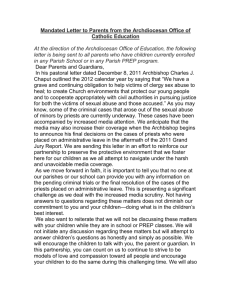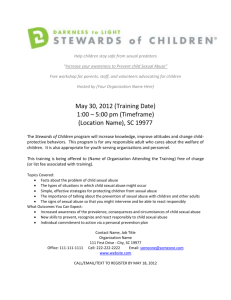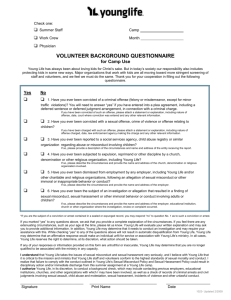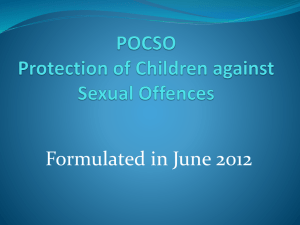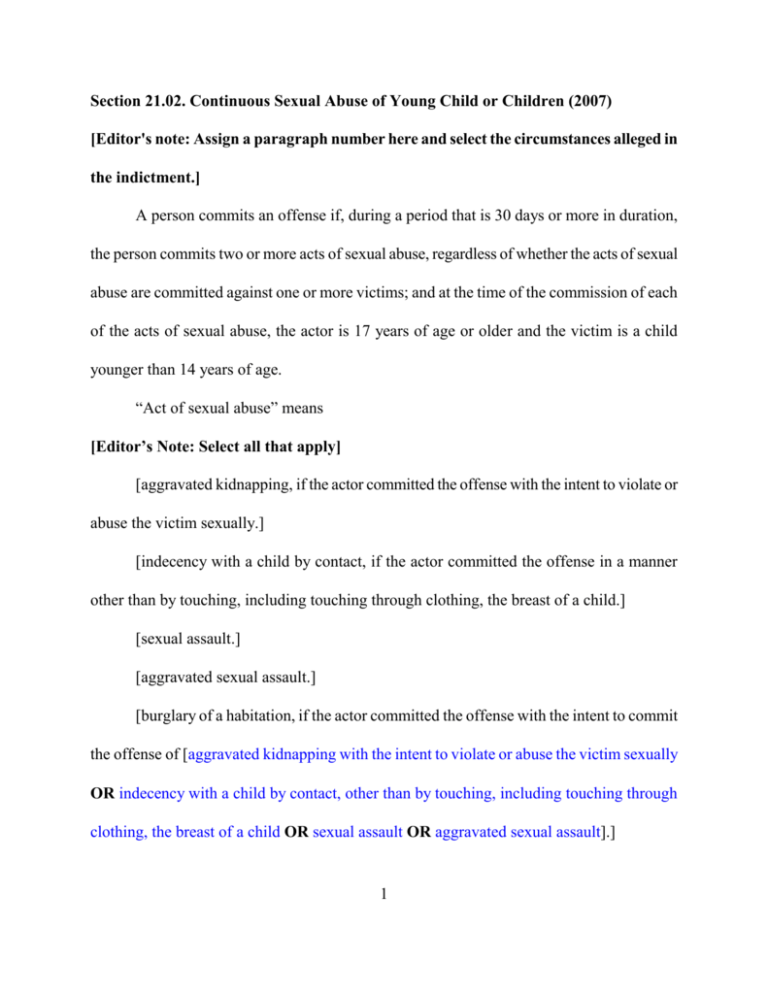
Section 21.02. Continuous Sexual Abuse of Young Child or Children (2007)
[Editor's note: Assign a paragraph number here and select the circumstances alleged in
the indictment.]
A person commits an offense if, during a period that is 30 days or more in duration,
the person commits two or more acts of sexual abuse, regardless of whether the acts of sexual
abuse are committed against one or more victims; and at the time of the commission of each
of the acts of sexual abuse, the actor is 17 years of age or older and the victim is a child
younger than 14 years of age.
“Act of sexual abuse” means
[Editor’s Note: Select all that apply]
[aggravated kidnapping, if the actor committed the offense with the intent to violate or
abuse the victim sexually.]
[indecency with a child by contact, if the actor committed the offense in a manner
other than by touching, including touching through clothing, the breast of a child.]
[sexual assault.]
[aggravated sexual assault.]
[burglary of a habitation, if the actor committed the offense with the intent to commit
the offense of [aggravated kidnapping with the intent to violate or abuse the victim sexually
OR indecency with a child by contact, other than by touching, including touching through
clothing, the breast of a child OR sexual assault OR aggravated sexual assault].]
1
[sexual performance by a child.]
[Editor's note: State the elements of the underlying offense(s) here. For
assistance, see the charge in this jury charge bank for the offense(s) named in the
indictment. Include all definitions associated with the underlying offense(s).]
“Child” means a person younger than 17 years of age who is not the spouse of
the actor.
“Spouse” means a person who is legally married to another.
“Person” means an individual, corporation, or association.
“Individual” means a human being who is alive.
“Actor” means a person whose criminal responsibility is at issue in a criminal
action.
“Another” means a person other than the actor.
[Editor's note: Assign paragraph number here.]
A person acts intentionally, or with intent, with respect to the nature of his conduct or
to a result of his conduct when it is his conscious objective or desire to engage in the conduct
or cause the result.
A person acts knowingly, or with knowledge, with respect to the nature of his conduct
or to circumstances surrounding his conduct when he is aware of the nature of his conduct or
that the circumstances exist. A person acts knowingly, or with knowledge, with respect to a
result of his conduct when he is aware that his conduct is reasonably certain to cause the
2
result.
[Editor's note: Assign paragraph number here.]
In order to find the defendant guilty of the offense of continuous sexual abuse of a
young [child OR children], you are not required to agree unanimously on which specific acts
of sexual abuse were committed by the defendant or the exact date when those acts were
committed. However, in order to find the defendant guilty of the offense of continuous
sexual abuse of a young [child OR children], you must agree unanimously that the defendant,
during a period that is 30 or more days in duration, committed two or more acts of sexual
abuse.
[Editor's note: Assign paragraph number here]
Now, bearing in mind the foregoing instructions, if you find from the evidence beyond
a reasonable doubt that on or about [date] in [name of county], Texas, the defendant, [name
of defendant], did [track indictment], you will find the defendant guilty of continuous sexual
abuse of young [child OR children] as charged in the indictment.
If you do not so find, or if you have a reasonable doubt thereof, you will find the
defendant not guilty.
[Select the following affirmative defense authorized by Tex. Pen. Code § 21.02(g) only if
requested by the defendant and evidence is submitted supporting the defense. See Tex.
Pen. Code § 2.04(c). Assign a paragraph number here, otherwise delete.]
It is an affirmative defense to the offense of continuous sexual abuse of young [child
3
OR children] that the actor:
(1) was not more than five years older than [the victim OR the youngest victim] of the
offense;
(2) did not use duress, force, or a threat against a victim at the time of the commission
of any of the acts of sexual abuse alleged as an element of the offense; and
(3) at the time of the commission of any of the acts of sexual abuse alleged as an
element of the offense:
(A) was not required under Chapter 62, Code of Criminal Procedure, to
register for life as a sex offender; or
(B) was not a person who under Chapter 62 had a reportable conviction or
adjudication for any of the following offenses or acts of sexual abuse:
(1) aggravated kidnapping, if the actor committed the offense with the
intent to violate or abuse the victim sexually;
(2) indecency with a child by contact, if the actor committed the
offense in a manner other than by touching, including touching
through clothing, the breast of a child;
(3) sexual assault;
(4) aggravated sexual assault;
(5) burglary of a habitation, if the actor committed the offense with the
intent to commit the offense of [aggravated kidnapping with the
4
intent to violate or abuse the victim sexually OR indecency with a
child by contact, other than by touching, including touching
through clothing, the breast of a child OR sexual assault OR
aggravated sexual assault];
(6) sexual performance by a child.
“Reportable conviction or adjudication” means a conviction or adjudication, including
an adjudication of delinquent conduct or a deferred adjudication, regardless of the pendency
of an appeal.
[Insert the following paragraphs as part of the affirmative defense instruction.]
The burden of proof is on the defendant to prove such a defense by a preponderance of
the evidence. The term “preponderance of the evidence” means the greater weight of the
credible evidence.
Now, therefore, if you find from the evidence beyond a reasonable doubt that the
defendant, [name of defendant], committed the offense of continuous sexual abuse of young
[child OR children], but you further find by a preponderance of the evidence that the
defendant:
(1) was not more than five years older than [the victim OR the youngest victim] of the
offense;
(2) did not use duress, force, or a threat against a victim at the time of the commission
of any of the acts of sexual abuse alleged as an element of the offense; and
5
(3) at the time of the commission of any of the acts of sexual abuse alleged as an
element of the offense:
(A) was not required under Chapter 62, Code of Criminal Procedure, to
register for life as a sex offender; or
(B) was not a person who under Chapter 62 had a reportable conviction or
adjudication for any of the following offenses or acts of sexual abuse:
(1) aggravated kidnapping, if the actor committed the offense with the
intent to violate or abuse the victim sexually;
(2) indecency with a child by contact, if the actor committed the
offense in a manner other than by touching, including touching
through clothing, the breast of a child;
(3) sexual assault;
(4) aggravated sexual assault;
(5) burglary of a habitation, if the actor committed the offense with the
intent to commit the offense of [aggravated kidnapping with the
intent to violate or abuse the victim sexually OR indecency with a
child by contact, other than by touching, including touching
through clothing, the breast of a child OR sexual assault OR
aggravated sexual assault];
(6) sexual performance by a child,
6
you will find the defendant not guilty.
7
Notes and definitions:
“Act of sexual abuse” as defined by Tex. Pen. Code sec. 21.02(c)
“Child” as defined by Tex. Pen. Code secs. 21.02(a); 22.011(c)(1)
“Spouse” as defined by Tex. Pen. Code sec. 22.011(c)(2)
“Person” as defined by Tex. Pen. Code sec. 1.07(a)(38)
“Individual” as defined by Tex. Pen. Code sec. 1.07(a)(26)
“Actor” as defined by Tex. Pen. Code sec. 1.07(a)(2)
“Another” as defined by Tex. Pen. Code sec. 1.07(a)(5)
“Reportable conviction or adjudication” as defined by Tex. Code Crim. Pro. art. 62.001(5)
8



